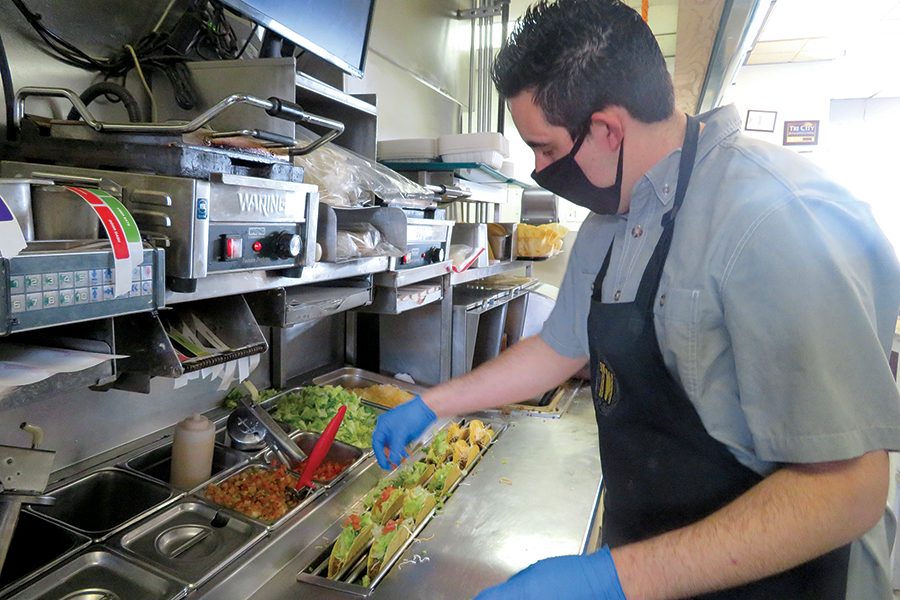
Home » Richland’s Tumbleweeds rolls through turbulent year
Richland’s Tumbleweeds rolls through turbulent year

March 15, 2021
When anyone asks the owner of Tumbleweeds Mexican Flair about his plans, he likes to quip: “I am just honored that you think I have a plan.”
The past year has been a lesson in flying by the seat your pants at the family-owned restaurant at 894 Stevens Drive in Richland.
But despite the past year’s challenges, owner Keith Moon said his business has weathered the chaos of pandemic 2020.
“We even have more employees now than we did pre-pandemic,” he said. He started 2020 with 10 and currently has 12.
Moon, 32, recently had an opportunity to reflect on the past year when he shut his restaurant down for some repairs in late February (which turned out to be more expensive than he’d planned on – that’s how it goes with improvement projects, right?, he asked.).
He admitted he made some mistakes but he’s also learned valuable lessons about managing the 21-year-old business – and even about Tri-City spending habits and the area’s economy.
Homework first
Moon and his wife Jane bought the restaurant in 2014 from his mother, Eve Moon.
“We’re a true family business,” he said.
Eve had worked as a regional manager for three TacoTime restaurants in the Tri-Cities for years. The company sold her the Kennewick and Richland locations when it pulled out of the market when its lease came due at Columbia Center mall.
She bought them in 2000, renaming them Tumbleweeds.
Her son began working in the Kennewick restaurant when he was 14.
Soon, he was closing the restaurant five nights a week; it evolved into a 40-hour work week.
“I’m cut from an entrepreneur’s cloth, but I knew I needed to finish school,” he said.
Moon spent his lunch period doing homework. He graduated from Kennewick’s Southridge High in 2006 with a 3.9 grade-point average.
His mother decided to close the Kennewick restaurant in 2008. It was tucked behind the Arby’s on Clearwater Avenue and didn’t get a lot of traffic.
Getting creative
Two developments in 2020 helped Moon’s business stay in the black when dining rooms closed because of the pandemic: preorders and a lunch contract with Liberty Christian School in Richland.
Tumbleweeds began presales of weekly take-and-bake enchiladas around June, with a different flavor every week.
“That was really awesome and our customers picked up what we were throwing down,” he said. “It bridged the gap to make up the difference from dining room dine-in losses. Once we started doing that, now that we’re back to regular, in terms of revenue, ordering and production, we brought back employees.”

Inspiration hit around the holidays when Moon received an air fryer for Christmas. He threw out an idea on Facebook: Would anyone be interested in air crisping Tumbleweeds’ burritos at home?
The restaurant pre-sold 150 trays.
“The air-fried burrito took off like a rocket,” Moon said.
Tumbleweeds hand-rolls 10 crisp burritos – beef, chicken or bean – which are refrigerated and ready to be cooked at home in an air fryer, or an oven. They retail for $15.
“We’re selling between 80 to 90 pans a week to fulfill residual interest in that. We are responsible for at least five air fryer purchases,” Moon said.
Moon said many use the restaurant’s mobile app to order the take-and-bake options, and the app saw 2,200 downloads in the year of the pandemic.
“Once the pandemic started, 100% of orders were drive-thru or takeout and our app kind of exploded. We doubled app downloads in one year. That’s been a blessing of pandemic,” Moon said.
The lunch contract
An unexpected lunch contract with Liberty Christian School in the fall helped offset the loss of lunchtime sales from the daily high school crowd.
Every Thursday, Tumbleweeds delivers crisp bean burritos, chicken soft tacos and cheese quesadillas to the private Christian school in Richland.
“That’s 150 items for us. Every week,” Moon said.
The school doesn’t have a commercial kitchen. It relies on partners to bring hot lunches as an alternative to lunches packed at home: Dairy Queen’s chicken strips on Mondays; Subway’s sandwiches on Tuesdays; Arby’s on Wednesdays; and Papa John’s pizzas on Fridays.
“The little kids love cheese quesadillas and the bigger kids like the burritos and tacos. There are quite a few (from the staff) that order from Tumbleweeds too,” said Lori Shaffer, lunch coordinator at Liberty Christian, which enrolls about 400 K-12 students.
A few observations
The restaurant owner has made a few observations about the economy of the Tri-City community, based on restaurant sales.
“When the first stimulus payments went out, I think people were kind of flush with cash. We live in an area that’s very much propped up by Hanford. There were furloughed employees who were getting their regular pay – the majority of them were. When people at home are getting full pay, then getting stimulus checks, it really did stimulate the economy. … In June-July we had a month and we were like, ‘This is great. This pandemic is working perfect for us.’ We were nestled in sweet spot. But, honestly, once that sort of bled out of the economy, then it died down again,” he said.
Moon said the uncertainty of the past year made it a roller coaster for the business.
“In business you’re trying to plan for what’s coming. We couldn’t plan for nothing. ...We don’t know what’s coming out of leadership tomorrow and how that going to change things,” Moon said.
Customers’ buying habits changed too. When his wife picks up dinner somewhere, she checks in with his grandmother or mother to see if she should pick up something for them. He notices other people do this too.
“Our order count has gone down dramatically in the pandemic but the average order ticket has gone up dramatically and it’s almost been a wash,” Moon said. Pre-pandemic the average was $10 and it’s currently $17.
In the early stages of the pandemic, Tumbleweeds, like many businesses, successfully applied for federal Paycheck Protection Program through Gesa Credit Union
Moon realized life wasn’t going back to normal in August.
“In June to July, we were waiting and at the whim of politics. I knew we had to do something and take control here. Once I realized that, I thought, ‘Let’s pretend it’s never going back to the way it was before.’ It’s sort of how take-and-bake enchiladas was born,” he said.
Charity sales
Though it started as a TacoTime, Tumbleweeds’ menu has evolved over the years, including using its own blend of spices, processes and products. “It’s been so long there’s just few similarities. We both have burritos and tater tots,” Moon said.
Tumbleweeds’ most popular offering and its “claim to fame” is the grilled steak burrito, Moon said.
He credits his wife for coming up with the popular cafeteria burrito (beans, rice, cheese, sour cream, burrito sauce, Siracha ranch, onion-cilantro mix).
Sale proceeds go to different charities. In 2019, Tumbleweeds paid off the Richland School District’s student lunch debt. It’s also made donations to Grace Kitchen and Office Moms and Dads, a nonprofit that works with foster children.
Lessons learned
Moon said his two biggest challenges in the past year have been working to respect where people are on what he calls the Covid spectrum – which ranges from those who believe it’s a fake virus to those who live in fear of getting it and never leave their home – and trying to adhere to the state’s changing regulations.
“In the beginning I was scared to death. I put on a strong and happy face all the time but the level of fear was overwhelming. A lot of people can relate to that. … the fear factor was extreme,” he said.
While listening to a Dave Ramsey podcast, he had an epiphany. “It’s OK to have fear and not know what’s coming next. It’s not OK to act on fear,” he said. “Due to fear, I had laid off people. But my fear, caused me to lay people off. My lesson was not to react in fear, but in fact.”
Local News Food & Wine
KEYWORDS march 2021




